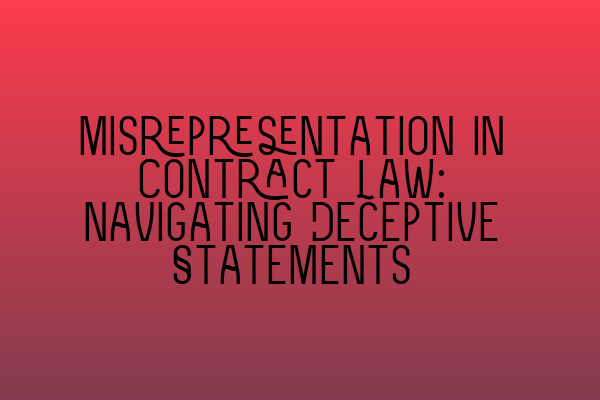Misrepresentation in Contract Law: Navigating Deceptive Statements
Contracts are the foundation of any business transaction, providing a framework for parties to exchange goods, services, or other valuable assets. However, what happens when one party makes false or misleading statements during contract negotiations? This is where the concept of misrepresentation comes into play, introducing legal challenges and implications that both solicitors and clients must navigate carefully. In this article, we will explore the different types of misrepresentation in contract law, the remedies available, and how to avoid falling victim to deceptive statements.
Types of Misrepresentation
Before delving into the legal aspects, it’s essential to understand the various types of misrepresentation that can occur during contract negotiations:
1. Innocent Misrepresentation
Innocent misrepresentation happens when a party makes a false statement unintentionally, without knowledge of its falsity. This could occur due to a misunderstanding or a genuine belief in the accuracy of the statement. Despite their innocence, the party may still be held liable for the consequences of their misrepresentation.
2. Negligent Misrepresentation
Negligent misrepresentation occurs when a party makes a false statement without exercising reasonable care to ensure its accuracy. Unlike innocent misrepresentation, negligence involves a failure to take reasonable steps to verify the truthfulness of the statement. The party making the false statement may be held liable for any resulting damages.
3. Fraudulent Misrepresentation
Fraudulent misrepresentation involves a party knowingly making a false statement with the intention to deceive the other party. It requires a deliberate intent to induce the other party into entering the contract and causing them to suffer harm as a result. Fraudulent misrepresentation is a serious offense and can lead to criminal charges in addition to civil liability.
Remedies for Misrepresentation
When misrepresentation occurs in a contract, the innocent party may seek various remedies to protect their interests. The available remedies depend on the type of misrepresentation and the circumstances of the case. Here are some common remedies for misrepresentation:
1. Rescission
Rescission is the most common remedy for misrepresentation, allowing the innocent party to void the contract and restore both parties to their pre-contract positions. Rescission essentially cancels the contract, treating it as if it never existed. However, this remedy is not available in all cases and is subject to certain limitations.
2. Damages
If rescission is not possible or appropriate, the innocent party can seek damages to compensate for any losses suffered as a result of the misrepresentation. Damages can include financial losses, reputational harm, and other consequential damages. The amount of damages awarded will depend on the specific circumstances of the case.
3. Specific Performance
In exceptional cases, where monetary compensation is inadequate to remedy the harm caused by misrepresentation, the innocent party may seek specific performance. This remedy requires the party in breach to fulfill their contractual obligations as originally agreed.
Avoiding Misrepresentation
Prevention is always better than cure, and avoiding misrepresentation in contract negotiations is no exception. Here are some essential steps to help mitigate the risk of misrepresentation:
1. Full Disclosure
Provide complete and accurate information to the other party during contract negotiations. Transparency is key in establishing trust and preventing misunderstandings that could lead to misrepresentation claims.
2. Conduct Due Diligence
Before making any statements or representations, conduct thorough due diligence to ensure their accuracy. Verify facts, consult experts if necessary, and rely on reliable sources of information.
3. Put it in Writing
Always document the terms and representations made during contract negotiations in writing. This helps establish a clear record of the parties’ intentions and reduces the potential for misunderstandings or false memories.
Conclusion
Misrepresentation in contract law is a complex and multifaceted issue that can have significant legal and financial consequences. By understanding the different types of misrepresentation, the available remedies, and adopting preventive measures, solicitors and clients can navigate contract negotiations with confidence. Remember, accuracy, transparency, and due diligence are crucial to safeguarding the integrity of any business transaction.
To learn more about navigating legal challenges and pitfalls, check out our related article: Navigating Legal Challenges and Pitfalls in Your Practice.
For a comprehensive comparison between barristers and solicitors, read our related article: Barrister vs. Solicitor: A Comprehensive Comparison.
Interested in exploring different solicitor specializations and finding your niche? Visit our related article: Exploring Different Solicitor Specializations: Finding Your Niche.
To understand the rise of virtual law practices and how to embrace them, check out our related article: Embracing the Rise of Virtual Law Practices.
Lastly, demystify the ethical responsibilities of solicitors by navigating our article: Navigating the Maze: Demystifying Ethical Responsibilities of Solicitors.
